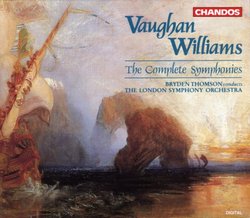| All Artists: Brian Rayner Cook, Ralph Vaughan Williams, Bryden Thomson, Simon Joly, London Symphony Chorus, London Symphony Orchestra, Roderick Elms, Catherine Bott, Yvonne Kenny Title: Vaughan Williams: The Complete Symphonies Members Wishing: 0 Total Copies: 0 Label: Chandos Release Date: 10/28/1992 Album Type: Box set Genre: Classical Styles: Historical Periods, Modern, 20th, & 21st Century, Symphonies Number of Discs: 5 SwapaCD Credits: 5 UPC: 095115908723 |
Search - Brian Rayner Cook, Ralph Vaughan Williams, Bryden Thomson :: Vaughan Williams: The Complete Symphonies
 | Brian Rayner Cook, Ralph Vaughan Williams, Bryden Thomson Vaughan Williams: The Complete Symphonies Genre: Classical
|
Larger Image |
CD DetailsSimilar CDs
|
CD ReviewsGood readings, great recordings Larry VanDeSande | Mason, Michigan United States | 04/07/2004 (4 out of 5 stars) "Critics worldwide have criticized this set as being too literal, as if to say the symphonies of Ralph Vaughan Williams need thorough interpreting before they can be great. I have never understood the charge against this set and have never understood critics that believe the symphonies are not strong enough to stand on their own without interpreter affectation. I agree the cycles by Adrian Boult (both of them) and Vernon Handley are wonderful and perhaps more consistent than this one, but neither conductor read the scores as thoroughly and both sets are a world away from this one in terms of sound. The London Symphony Orchestra plays wonderfully throughout this set, from the Sea Symphony to the final note in Symphony 9. Meanwhile, they turn in one of the most underrated cerebral performances of "Pastoral" Symphony 3 ever committed to disc, LP, tape or wax cylinder. The Thomson recording of 3 is a wonderful, literal, visceral and hyperintelligent reading of music that is normally spoiled by interpretation. Thomson also outstandingly in Vaughan Williams greatest symphonies including the "London" Symphony 2, the wartime Symphony 4 and Vaughan Williams most wonderful creation, Symphony 5. I was a tad let down by "Antarctica" Symphony 7 when I first heard it. Today, however, it seems to fit well in the Thomson worldview representing the thoughts of Vaughan Williams and not his interpreters. The criticism that Thomson was not "atmospheric" in this recording deflects what it actually is: the music Vaughan Williams envisioned in his head at the time he composed it. Vaughan Williams collaborated with Boult in his earliest recordings. He is said to have thought one way about the music, then told Boult, "But you play it the way you think correct." I guess this means there is no such thing as "definitive" Vaughan Williams, eh? If you subscribe to that theory, you should hear this set for dynamic sound and playing. Among the integral sets availble, even if it does not project the atmospheric creations other interpreters have put on disk, Thomsen fares well against the best (Boult mono and stereo, Handley, Previn) and the rest (Bakels, Haitink, etc.) and sounds better than any of them." No problem here, either Kirk Haberman | Grove City, PA United States | 01/22/2001 (5 out of 5 stars) "This a beautifully played set. I had heard nothing about production flaws until I read the other reviews. The set I bought was fine. When I am feeling particularly like an anglophile, there are few things better to listen to then these performances of the Vaughan Williams symphonies. Thomson shows flexibility and breadth of expression in the diverse sorts of sounds that Vaughan Williams calls for. From what Sir Adrian Boult called the "modal blessedness" of the 3rd, to the jarring and dissonant 4 & 6(Vaughan Williams himself wasn't entirely sure what he thought of the 4th upon hearing it for the first time, "but this is what I meant by it.") with the tranquil 5th in between to the vast, craggy, and often inhuman landscapes of 7,8,9, the Thomson-molded sound can best be described as "British." The pastoral meloncholy, which is a peculiarly British mood, expressed in the early symphonies is dealt with masterfully as is the cool, detached and dissonant music of the later symphonies. Keeping in mind to what degree Vaughan Williams was rooted in English folk music and how oddly indifferent he was to the German symphonic tradition of Beethoven, Bruckner, & Mahler, these recordings, more than any others I've heard seem to express just what Vaughan Williams had in mind. In the midst of applauding Thomson's conducting, I would be remiss in not mentioning the fine playing of the London Symphony Orchestra. The brass in particular are excellent; playing often with the cold clarity and precision called for, and avoiding gushy sentimentality (even in 2,3, & 5). It is an all-round excellent set, and for what it's worth, I highly advise it." Vaughan Williams with some steel in its spine Paul Bubny | Maplewood, NJ United States | 10/24/2005 (4 out of 5 stars) "However much some of the other complete Vaughan Williams symphony cycles have to recommend them, I don't know that the composer would have cottoned to their tendency to either sentimentalize the music or play up its lyrical elements at the expense of sterner stuff. The late Bryden Thomson did neither, and the result is one of the most clear-eyed, tough-minded, and convincing VW cycles available--comparable to Adrian Boult's almost-complete 1950s series. Paradoxically, that sharp focus actually heightens the sense of mystery in passages such as the opening movement of the Eighth Symphony and the enigmatic final pages of the Sixth. Only "A Sea Symphony" is less than a total success, and even there the expansive final movement impresses. This 5-CD set omits the shorter works that served as makeweights in the individual issues, but Chandos has reissued some of those recordings elsewhere."
|

 Track Listings (4) - Disc #1
Track Listings (4) - Disc #1
